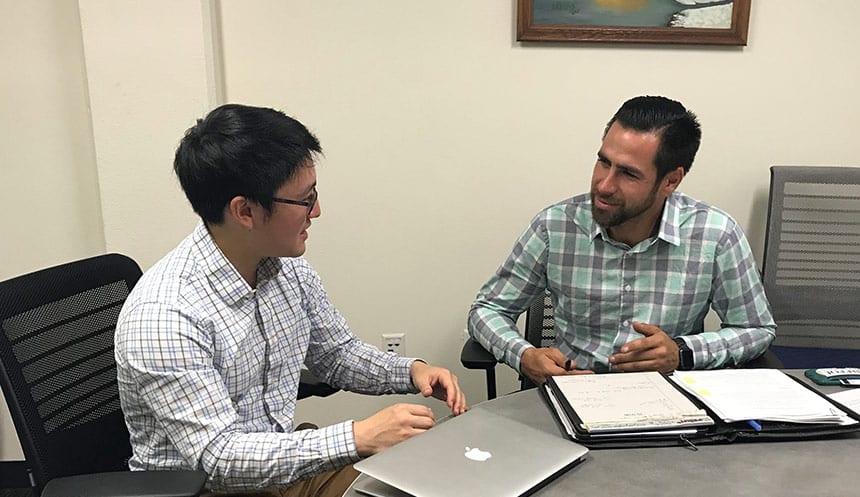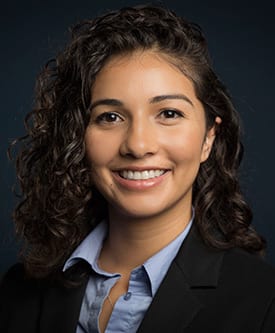
By Andrew Cohen
From the moment she enrolled at Berkeley Law, Aracely Abarca ’18 knew she wanted to learn how to start her own firm and “gain insight on how others have taken that leap.”
Enter William Kell, who directs the school’s New Business Practicum. Kell knows that not all law students envision their future in an urban law office catering to well-heeled clients. So he developed the fledgling course Practice for the 99% (Practice 99), as an alternative training ground for budding lawyers.

Practice 99 launched this fall—a California Bar Foundation-funded class developed through a collaboration between Berkeley Law, UC Davis Law School, and San Joaquin College of Law. The course provides foundational training in how to open and operate a small or solo practice while serving clients of limited means—and in remote regions. It was designed to give students the tools needed to open their own sustainable practices while assisting underserved communities such as California’s Central Valley.
The New Business Practicum began involving students in assisting Central Valley small businesses in 2011, spurred by a Berkeley Law study that detailed the region’s status as one of the poorest in the nation. Kell noted that while there is about one attorney for every 46 people in San Francisco, that ratio mushrooms to one for every 1,078 Central Valley residents.
“Since then, we’ve developed a regular set of student-provided legal services to help low-income Valley entrepreneurs—but we’re from Berkeley,” he said. “We continue to wonder: where are all the practices serving low- to modest-means clients? Maybe our law school can help create more.”
Insider insights
Kell enlisted a team of Berkeley Law alumni who have successfully opened their own firms to help teach Practice 99 students in the basics of business modeling, budgeting, and cultivating a customer base.
The panelists “each provide a different perspective and their advice has been great,” Abarca said. “The most surprising aspect is the different ways in which people have started their own firms. No path has been the same, and it’s been very interesting to learn about the different trajectories.”
Students also learn about different for-profit and non-profit entity options for law firms, risk management insurance, marketing and client recruitment, and the importance of mentoring and referral arrangements to support a practice.

Hamza Jaka ’18, who will likely join a small entertainment law firm in Chicago after graduation, said he enrolled because “I think I’d like to work at my own law firm someday,” and wanted to learn management and accounting skills.
Surprised to discover just how widely solo and small practices are used, Jaka said, “it’s really wonderful to hear from attorneys that they’re successful and happy in that role. I was looking into a small practice as a better way to make the practice of law accessible and to build client relationships. This class strengthened that conviction.”
Abarca took part in the New Business Practicum Bootcamp last year, a six-week course that links students with area startups at local incubators. She credits that experience for stoking her interest in eventually starting her own firm. “I was inspired by the clients’ entrepreneurial spirit,” Abarca said. “If I hadn’t taken Practice 99, I’d be less certain of how and when to start planning for making that leap.”
More resources
In the past year, Kell raised more than $400,000 to hire Practicum Deputy Attorney Kevin Xu ’15 and a new deputy outreach specialist for the Central Valley, Desiree Lafleur ’12. An expanded cadre of 18 Berkeley Law students now visit business incubators at UC Merced and Fresno State twice per month to provide comprehensive legal services, offering Practice 99 students a model for how to extend services to an underserved region.
In October 2016, Berkeley Law and UC Merced pledged to co-develop a legal assistance program called Central Valley Ventures. The Practicum will expand its workshops and office hours to all of Merced and Fresno counties by 2018, and add two additional Valley counties each year thereafter.
“We’re actively working with local stakeholders to create a more welcoming atmosphere for entrepreneurs,” Xu said. “Without access to affordable legal guidance, entrepreneurs usually have to wing it, even in the context of an unforgiving, well-regulated, and litigious marketplace.” In a region still recovering from the 2008 economic recession, Xu called that outcome “particularly harrowing” for new entrepreneurs and their families.
Among the new businesses benefiting from these efforts: Sweep Energy, a Valley-based tech startup that creates devices for monitoring energy usage in industrial machines. The Practicum assisted with the company’s entity formation, stock issuance, and intellectual property protection, and helped develop reseller and cloud service agreements for its customers.
“The legal services provided by the New Business Practicum have made us more wise to contract law and how to develop proper business relationships,” said Sweep Energy CEO Agustin Roldan. “Having that type of legal expertise here in the Central Valley helps us understand how best to position our company for success. Problems such as developing initial pilot programs with customers was made easier knowing we had legal representation that understood how best to navigate common startup challenges.”
That type of impact “shows that lawyers can reach the underserved whether they live in their area or not,” Kell said. “Students don’t always know that’s a viable career option when they come to law school. It’s gratifying that we can provide students with the tools and training to follow their passions, and highlight another potential career path to help clients who desperately need affordable, high-quality legal assistance.”